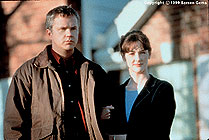|
|
|
|
Arlington
Road
|
 |
|
The opening images of Arlington Road could have come only from a filmmaker who has overdosed on the collected TV works of David Lynch and Mark Frost (Twin Peaks) and Chris Carter (The X-Files, Millennium). As a boy staggers through suburban streets, everything is rendered creepy, haunted and menacing: images shake, colours turn strange, atonal music crashes and screeches. The boy makes it to the emergency ward, care of a friendly neighbour, Michael (Jeff Bridges). But there is no such respite for the rest of us. Arlington Road is a relentlessly portentous film which rains blows upon the audience's head at every moment. Michael is a university Professor who teaches a rather intense class on the history of terrorism. He clearly has 'personal issues' in relation to this topic: his wife was killed while trying to lead an ill-advised FBI raid on a family home containing would-be extremists. Michael's overdeveloped paranoid sense kicks in when he meets the new neighbours. Actually, any sensible soul would be worried at the sight of these two moving in next door: Oliver (Tom Robbins) with his too-daggy haircut and mad eyes, Cheryl (Joan Cusack) with her nervous twitches and high-pitched banalities. As Michael begins to uncover past dirt on Oliver, the film needles a classic ambiguity: is it simply Michael's own delusional mania, his inability to really trust anybody – or are the scary neighbours really hiding something dark and dangerous? In case we forgot to intuit these questions, director Mark Pellington throws in a '90s update on the spooky glimpses of the 'people next door' in Roman Polanski's Rosemary's Baby (1968): here, a backyard barbeque is bathed in hellish, red light; populated by furtive, badly dressed nerds; and smothered in the boomy, truly frightening sound of KC And The Sunshine Band performing "Get Down Tonight". Near the start, Michael asks his class a good, serious question: "Why do increasing numbers of ordinary citizens organise against their government?" But the film has no real interest in answering or exploring this question. Just as American films of past decades demonised left-wing terrorists as loony, perverse, alienated and bomb-crazy, now movies aspiring to the hip label of independence peddle a caricature of the right-wing terrorist as stunted, dissatisfied and nostalgically obsessed with preserving the sanctity of home. Ultimately, every interesting and intriguing moment in this film serves one function only: as a narrative set-up or plant for some ingenious twist further down the track. Although Pellington and writer Ehren Kruger make studious reference to classics about paranoid individuals trying to take action against a malevolent State – especially Alan Pakula's The Parallax View (1974) and Brian De Palma's Blow Out (1981) – this is an essentially mindless and thoroughly apolitical film, its eyes fixed solely on the prize of a final, neat, gee-whiz frisson. It is a stridently hysterical film, with Bridges cranked up to a high, histrionic level from the word go. Robbins – who seems to enjoy alternating saintly left-liberal roles and beastly right-conservative ones – is as unsubtle as the sound-and-light show happening ceaselessly around him. Poor Cusack is cast purely as an oddball special effect. Arlington Road has recently been showcased in several Film Festivals around Australia. But it is the worst kind of faux arthouse movie – a purely plot-driven confection masquerading as an idea-driven testament to our severely troubled times. MORE Pellington: The Mothman Prophecies © Adrian Martin August 1999 |
![]()